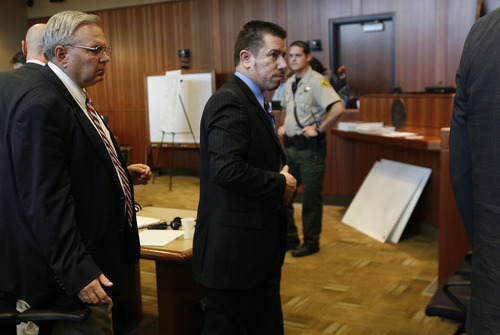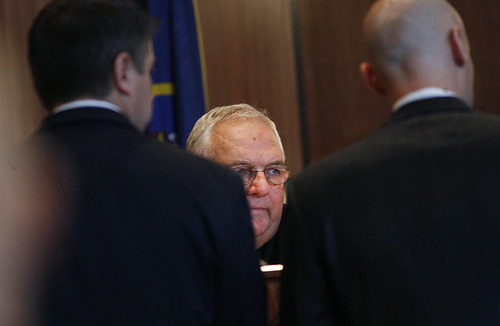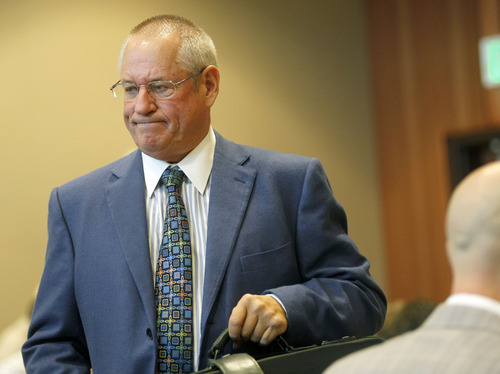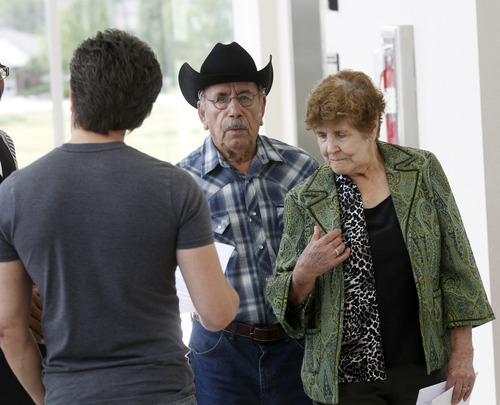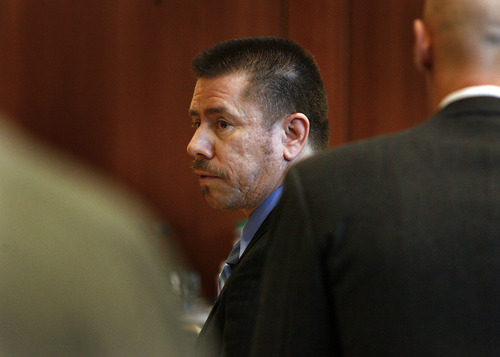This is an archived article that was published on sltrib.com in 2012, and information in the article may be outdated. It is provided only for personal research purposes and may not be reprinted.
The first thing they did was poll each other.
They said the words aloud: five for guilty, three for not.
It was 3:30 p.m. on the afternoon of Aug. 17, as jury deliberations began for the man accused of killing Millard County Sheriff's Deputy Josie Greathouse Fox in January 2010. If the decision had to be made right then, the eight jurors would have been deadlocked and Roberto Miramontes Román would have been retried.
Eight hours and 30 minutes later, everything changed.
In interviews with The Salt Lake Tribune this week, three jurors discussed the deliberations, mapping the path they took to a not-guilty verdict that drew criticism and prompted shock and anger across the state.
"We want to see killers go to jail just like the next person," said Gary Cooper, an Alpine realtor. "But in this particular case, all the stars kind of lined up to where quite possibly a murderer walks."
—
The origin of doubt • After the first straw poll, the five men and three women took some time to go over their own notes from the week-long trial in Spanish Fork, taking another look at the questions that had formed in their minds as they listened to officers and experts testify to events before and after Fox was killed.
When the forewoman, a recent Brigham Young University graduate named Nicole Kay, had everyone regroup, the confusion began.
"We thought we would go through the events chronologically and talk about if the evidence lined up with one narrative or another," she said. "That spawned into a million conversations."
A few jurors put on headphones and listened to Román's purported confession to police after his arrest on Jan. 6, 2010.
One man, who his fellow jurors would soon learn was a law student, examined the autopsy report and the diagram of Fox's wounds. He didn't believe the trajectory of the bullets as shown in the diagram matched the prosecution's story.
Already, doubts were beginning to bubble.
—
'Shredding' the evidence • At 5:30 p.m., the jurors took another poll, this time anonymously and to avoid pressure, though some were vocal about their positions.
The law student was the "loudest and most recalcitrant" juror, Kay said. "I don't know if he should have been on the jury," she said. "He presumed himself to be an expert on the law."
Jared Trent, the law student, was vocal early on about his belief that Román was not guilty. But he was not alone: A theater professor with "a very analytical mind" was "shredding the evidence," Kay said.
Trent said he and the professor "were fairly instrumental" in the not-guilty verdict. "I would say we were doubtful at the beginning. I wouldn't say we were definitely not guilty. But we had lot of problems with what we were getting."
In the end, their voices helped fell the jury's final holdout, resulting in acquittal.
"I've had friends tell me I'm now one of the most hated people in Utah," Trent said.
—
The brother's role • The result of the second poll was an even split. So the jury listened to the recordings of Fox and other deputies talking over the radio in the moments before her death.
Fox's sergeant, Rhett Kimball, has testified he saw two vehicles stop briefly on a rural road near the tiny settlement of McCornick. He ordered Fox to follow the Cadillac and gave her the go-ahead to make the traffic stop just outside of Delta.
"10-4," Fox said over the radio at 1 a.m. on Jan. 5. "I'll be over by the ballpark."
Ten minutes after those words, dashboard camera footage from Millard County Sheriff's Deputy Mike Peacock's car showed a sergeant bending over Fox's body in the dark of early morning.
The jurors wondered where Fox's footage was. The video would have made it open and shut, they said, not knowing the camera was broken at the time of the fatal stop.
"We wondered about a lot of evidence," Kay said. "We didn't have any evidence in the 10 minutes between when the drug deal happened and when Josie Fox was dead."
Where were Ryan Greathouse's phone records? Where was his account of that night? Jurors were not told that most of Ryan Greathouse's statement to police had been ruled inadmissible.
Greathouse, Fox's brother, had met with Román on the rural road in McCornick, where the two men smoked methamphetamine together, prosecutors said. Greathouse died months later of an overdose in a Las Vegas hotel room.
Why didn't the deputies immediately pull over Greathouse's truck as it left McCornick that night? Why hadn't they tested his DNA samples against other evidence?
"They had never gone to any sort of effort to eliminate him as a potential suspect," Trent said.
—
A compelling witness • The recording was bad and that "pissed me off," an exasperated Gary Cooper said.
Cooper, the realtor, is a former professional baseball player who had never served on a jury. After five days of testimony, he walked into the jury room "80 or 90 percent" sure Román was guilty. "But there were question marks," he said.
The lynchpin in the prosecution's case was Román's own words to police at the Beaver County Sheriff's Office after his arrest.
Cooper listened as two detectives testified that Román confessed to becoming upset when Fox started following him, then grabbing the AK-47 Greathouse had given him to help settle a drug debt and firing it out the window, over his shoulder, killing the deputy.
Cooper believed them, but the audio of the interview was bad.
Beaver County officials had put the microphone near an air vent, making the recording inaudible in many parts and the transcript spotty. A couple of jurors "tried to read into what's really happening. Did he get led down a road [to confession]?" Cooper said. "It's so subjective."
Trent and other jurors focused on Román's discussion with police — or lack thereof — about Greathouse.
During the trial, Román took the witness stand in his own defense. He testified that it was Greathouse who shot Fox, and that Greathouse had threatened Román's children if he did not take the fall for the killing. If Greathouse really had threatened Román into being the fall guy, maybe the story fit, Trent said.
"Going through the confession, some of the parts we could make out, it seemed to indicate that he was denying any knowledge of Ryan Greathouse," he said. "Why would he say he didn't know who Ryan was? Why would he make up that he was smoking meth with a stranger? That lent some credence to his testimony."
Jurors discussed Román's conflicting statements.
Román was "very compelling," Cooper said. "I'm not saying he wasn't lying. I'm saying he did a phenomenal job. If he's lying, he could have won an Emmy or a Grammy or an Oscar or whatever."
—
What is reasonable doubt? • At 8:30 p.m., there was another anonymous poll.
Now there were five for not guilty.
Others on the jury had experience with firearms and questioned the prosecution's account of the shooting. The jury spent a lot of time "speculating about different theories," Kay said.
Most of the discussions were friendly, but Trent said he felt they took racist turns at times. Someone made a joke about "any time you have a chance to put a Mexican away you should take it," Trent said. "One of the jurors would read Roberto's testimony with a Mexican accent. … That got me up a little more and made it a little more heated."
After the 8:30 poll, Kay wrote to 4th District Judge Donald Eyre, asking him how long they should go if they could not reach a unanimous decision. He wrote back and encouraged them to stay as long as they were making progress.
Throughout the deliberations, Cooper was a "peacemaker," someone who was working toward consensus, Kay said.
For Cooper, it was a "coin flip." Even if Román hadn't pulled the trigger, Cooper thought, he was a bad guy — a drug dealer, a drug user, a man with a gun he shouldn't have had, who could have stopped a cop's murder.
"I would have had no problem [voting] guilty and sending him to prison for a long, long, long time. I can sleep with that," Cooper said. "But I told the rest of them, 'If you guys in your minds … at the end of the day are hung up on beyond a reasonable doubt, then not guilty.' "
Some in the room said that eight hours of disagreement was proof enough of reasonable doubt. Kay said she was looking for "one piece of key evidence" to help push her toward finality.
"If you feel like you need something more, that's the reasonable doubt," Trent said. "I certainly don't want at any point to let a cop killer go, but it was frustrating. We just felt like there was stuff we needed that we didn't have."
But even now Cooper is unsure about reasonable doubt. What does it mean? he asks, calling it "bad verbiage." The former BYU baseball player puts it this way: "I know there's a God. Have I ever seen Him? No. If I had to say beyond a reasonable doubt [is there a possibility God doesn't exist]? Yeah, there's a possibility."
—
The holdout • At 10:30 p.m., the judge wrote to the jurors, asking about progress. At that moment, there were seven for not guilty. And then there was Nicole Kay.
Throughout the deliberations, Kay had worked through the evidence that had been spread over the long wooden table in the small jury room.
From time to time, she looked out one of the room's two windows, onto a lawn where she saw the Greathouse family waiting.
"There were several times I thought how the verdict would affect them," she said.
Over the last 30 minutes of the night, the civility that had marked deliberations was worn down by exhaustion and desperation.
Everyone wanted to go home.
The law student said they had stayed so long he was worried about an older juror driving home safely to Payson, according to Kay.
No one was excited about returning Saturday to deliberate.
"There was a lot of interpersonal pressure," Kay said. "There was intense pressure for me to conform and I wish I would have stayed strong and said we weren't ready."
As the pressure built, Cooper spoke with Kay.
"I said, 'I did the best I could with the evidence I was presented,' " he recalled. "The part that allows me to sleep at night is I believe there's a higher power, God if you will, that will ultimately reconcile the error that we're going to make on this decision if we make an error. The ultimate judgment is going to be made by a higher power."
—
Disappointment, regrets • Just after 11 p.m., the crowd that had waited around the Spanish Fork Courthouse all night filed back in the courtroom. Kay handed the verdict form to the bailiff, who walked it to the judge.
The verdict was read: "Not guilty."
"We all felt the disappointment," Kay said.
Eyre asked if either side would like the jury polled. After a moment of confusion, one of the prosecutors said yes. One by one, the eight jurors were asked if that was their verdict and one by one, they said yes.
"There was a moment when I thought, 'What would happen if I said no?' " Kay said. "'No. I think he's guilty. I'm sorry. I know we want to go home, but we're not decided on this.' "
Instead she watched Deputy Millard County Attorney Pat Finlinson put his head between his hands.
"The utter disappointment and deflation of a man who's been working on something for 2½ years and it's gone in a second," Kay said. "I saw her family crying and they wouldn't look into our eyes. It was awful."
Said Cooper: "I saw more hurt in [Finlinson's] face then I've ever seen in an adult male's face. It broke my heart."
The jurors walked down the stairs, past TV cameras.
"I felt sick to my stomach," Cooper said, "and I had far less confidence in the process than I had going in."
He wasn't the only one.
"The next morning I woke up and just wished we were going to the courthouse with refreshed minds to look at it," Kay said.
She can't say for sure if the verdict would have changed. But she's awakened each morning since filled with regret, and has spent part of each day crying as those eight hours replay in her mind.
afalk@sltrib.comTwitter:@aaronfalk


